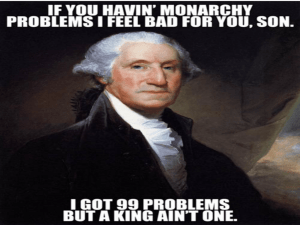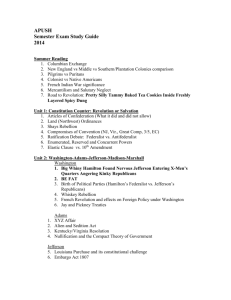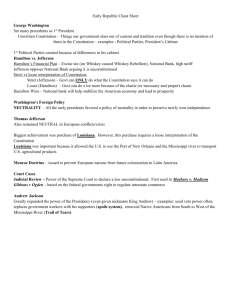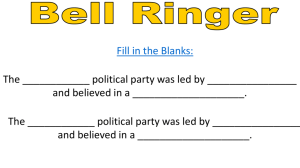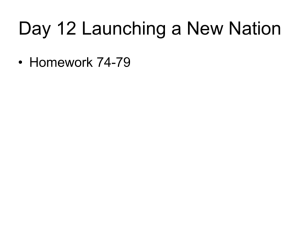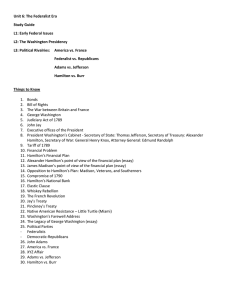Chapter 10: Launching the New Ship of State, 1789-1800
advertisement
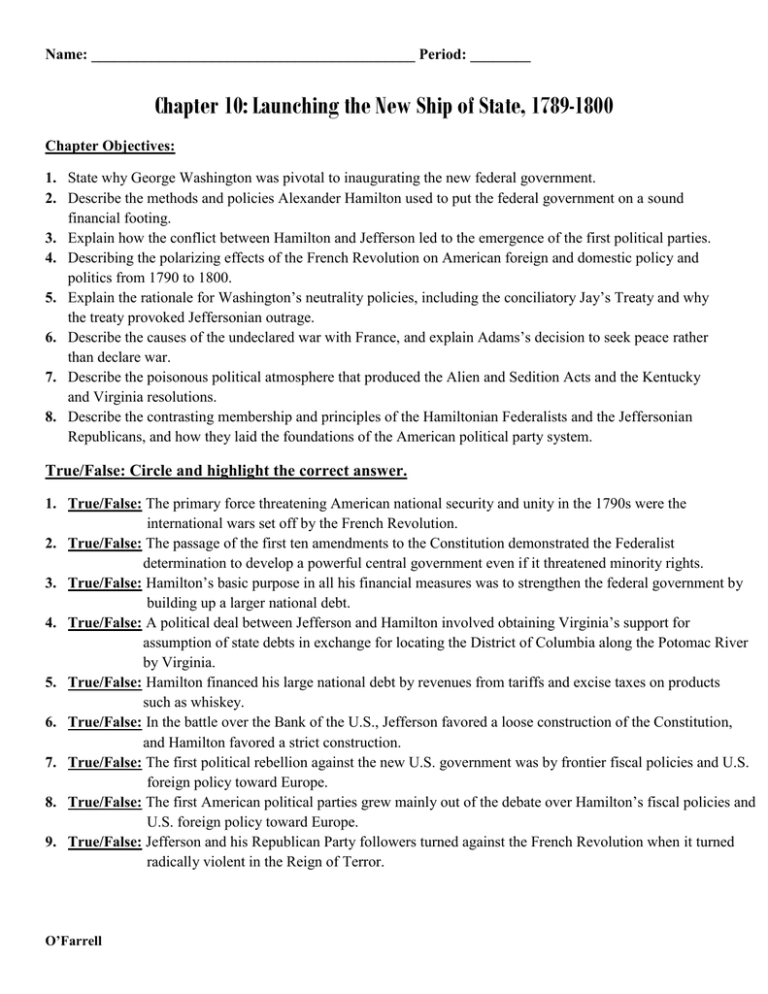
Name: ___________________________________________ Period: ________ Chapter 10: Launching the New Ship of State, 1789-1800 Chapter Objectives: 1. State why George Washington was pivotal to inaugurating the new federal government. 2. Describe the methods and policies Alexander Hamilton used to put the federal government on a sound financial footing. 3. Explain how the conflict between Hamilton and Jefferson led to the emergence of the first political parties. 4. Describing the polarizing effects of the French Revolution on American foreign and domestic policy and politics from 1790 to 1800. 5. Explain the rationale for Washington’s neutrality policies, including the conciliatory Jay’s Treaty and why the treaty provoked Jeffersonian outrage. 6. Describe the causes of the undeclared war with France, and explain Adams’s decision to seek peace rather than declare war. 7. Describe the poisonous political atmosphere that produced the Alien and Sedition Acts and the Kentucky and Virginia resolutions. 8. Describe the contrasting membership and principles of the Hamiltonian Federalists and the Jeffersonian Republicans, and how they laid the foundations of the American political party system. True/False: Circle and highlight the correct answer. 1. True/False: The primary force threatening American national security and unity in the 1790s were the international wars set off by the French Revolution. 2. True/False: The passage of the first ten amendments to the Constitution demonstrated the Federalist determination to develop a powerful central government even if it threatened minority rights. 3. True/False: Hamilton’s basic purpose in all his financial measures was to strengthen the federal government by building up a larger national debt. 4. True/False: A political deal between Jefferson and Hamilton involved obtaining Virginia’s support for assumption of state debts in exchange for locating the District of Columbia along the Potomac River by Virginia. 5. True/False: Hamilton financed his large national debt by revenues from tariffs and excise taxes on products such as whiskey. 6. True/False: In the battle over the Bank of the U.S., Jefferson favored a loose construction of the Constitution, and Hamilton favored a strict construction. 7. True/False: The first political rebellion against the new U.S. government was by frontier fiscal policies and U.S. foreign policy toward Europe. 8. True/False: The first American political parties grew mainly out of the debate over Hamilton’s fiscal policies and U.S. foreign policy toward Europe. 9. True/False: Jefferson and his Republican Party followers turned against the French Revolution when it turned radically violent in the Reign of Terror. O’Farrell Name: ___________________________________________ Period: ________ 10. True/False: President Washington believed that America was so powerful that it could afford to stay neutral in the great revolutionary wars between Britain and France. 11. True/False: John Jay’s unpopular treaty with Britain stirred outrage among many Americans and fueled the rise of Jefferson’s Republican Party. 12. True/False: Adams decided to seek a negotiated peace with France in order to unite his Federalist party and enhance his own popularity with the public. 13. True/False: The Alien laws were a reasonable Federalist attempt to limit uncontrolled immigration into the U.S. and protect dangerous French revolutionaries from weakening American national security. 14. True/False: Jeffersonian Republicans believed that common people were not to be trusted and had to be led by those who were wealthier and better educated. 15. True/False: The Jeffersonian Republicans generally sympathized with Britain in foreign policy, while the Hamiltonian Federalists sympathized with France and the French Revolution. Multiple Choice: Write the capital form of the letter of the correct answer in the space provided. 16. __________A key addition to the new federal government that had been demanded by many critics of the Constitution and others in the ratifying states was a. A cabinet to advise the president. b. A written bill of rights to guarantee liberty. c. A supreme court. d. Federal assumption of state debts. e. A federal district where the capital would be located. 17. __________ The influential founder and member of Congress who personally wrote the Bill of Rights was a. George Washington b. Thomas Jefferson c. John Marshall d. Alexander Hamilton e. James Madison 18. __________ The Bill of Rights is the name given to provisions whose actual legal form consists of a. An executive proclamation of President George Washington. b. Article II, Section 3 of the U.S. Constitution. c. A set of rulings issued by the Supreme Court. d. The first ten amendments. e. The common law rights inherited from the English Magna Carta. 19. __________ The Ninth and Tenth Amendments partly reversed the federalist momentum of the Constitution by declaring that a. The federal government had no power to restrict the action of local government. b. The powers of the presidency did not extend to foreign policy. c. All rights not mentioned in the federal Constitution were retained by the states or by the people themselves. d. The Supreme Court had no power to rule in cases affecting property rights. e. The states themselves were not bound by the guarantees in the bill of rights. O’Farrell Name: ___________________________________________ Period: ________ 20. __________ Hamilton’s first financial policies were intended to a. Finance the new government through the sale of western lands. b. Fund the national debt to have the federal government assume the debts owed by the states. c. Repudiate the debts accumulated by the government of the A of C. d. Insure that low federal taxes would spur economic growth. e. Guarantee that the dollar would become a sound and respected international currency. 21. __________ The deep disagreement between Hamilton and Jefferson over the proposed Bank of the U.S. was over whether a. The Constitution granted the federal government the power to establish such a bank. b. It would be economically wise to create a bank-guaranteed national currency. c. The bank should be under the control of the federal government or the states. d. Such a Bank violated the Bill of Rights. e. The Bank should be a private institution or an agency of the federal government. 22. __________ The first American political parties developed primarily because of a. A sectional division over slavery. b. The Founders’ belief that organized political opposition was a necessary part of good government. c. The antifederalists’ continuing hostility to the legitimacy of the new federal Constitution. d. Patriotic opposition to foreign intervention in American domestic affairs. e. The opposition of Thomas Jefferson and his followers to Hamilton’s financial policies and enhancement of federal government power. 23. __________ The Whiskey Rebellion proved to be most significant in the long run because it a. Shows that the tariff was more effective producer of revenue than the excise tax. b. Showed that the new federal government would use force if necessary to uphold its authority. c. Demonstrated that the American military could suppress a powerful domestic rebellion. d. Showed the strength of continuing antifederalist hostility of the new constitutional government. e. Showed that Americans would not tolerate federal taxation of their alcohol, tobacco, and firearms. 24. __________Regarding the French Revolution, most Jeffersonian Democratic-Republicans believed that a. Even the extreme violence of the Reign of Terror was regrettable but necessary. b. The overthrow of the king was necessary, but the Reign of Terror went too far. c. The Revolution should be supported by American military aid if necessary. d. The French Revolution represented a complete distortion of American Revolutionary ideals of liberty. e. Its political goals were valid but its atheistic attack on Christianity was unjustified. 25. __________President Washington’s foreign policy rested on the firm conviction that a. There should be an end to European colonialism in the Americans. b. The U.S. could enhance its power by mediating between warring Britain and France. c. American need to adhere firmly to its Revolutionary alliance with France. d. American ought to enter the French-British war only if its own republican ideals were at stake. e. The U.S. was too militarily weak and political disunited to become involved in European wars. O’Farrell Name: ___________________________________________ Period: ________ 26. __________ In the 1790s, the powerful Miami Indians led by Little Turtle battled with the U.S. Army for control of a. Lake Erie and Lake Huron b. The Ohio territory c. Kentucky d. Hunting rights west of the Appalachians e. Florida 27. __________ George Washington’s successor, John Adams, was politically crippled by a. Washington’s refusal to give him his whole-hearted endorsement. b. The political hostility directed at his assertive wife, Abigail Adams. c. The attacks and plots by enemies within his own Federalist party, including Hamilton. d. His ignorance and weakness in managing foreign and military affairs. e. His support for the unpopular Alien and Sedition Acts. 28. __________ The U.S. became involved in an undeclared war with France in 1797 because of a. Fierce American opposition to the concessions of Jay’s Treaty. b. American anger at attempted French bribery of American diplomats in the XYZ Affair. c. French interference with American shipping and freedom of the seas. d. President Adams’s sympathy with Britain and hostility to Revolutionary France. e. France’s refusal to sell New Orleans and Louisiana. 29. __________ Thomas Jefferson and the Republican Party essentially believed that the whole future of American society rested on an essential foundation of a. Wealthy planters and merchants. b. International trade and westward expansion. c. Free, white, educated, small landowning farmers. d. Evangelical Protestants and learned scientists and technicians. e. A political coalition of whites and African Americans. 30. __________ The Federalists essentially believed that a. Most governmental power should be retained by the states or by the people themselves. b. The federal government should provide no special aid to private business. c. The common people could, if educated, participate in government affairs. d. The U.S. should have a powerful central government controlled by the wealthy and well educated. e. The U.S. should isolate itself from Europe and turn toward westward expansion. O’Farrell
